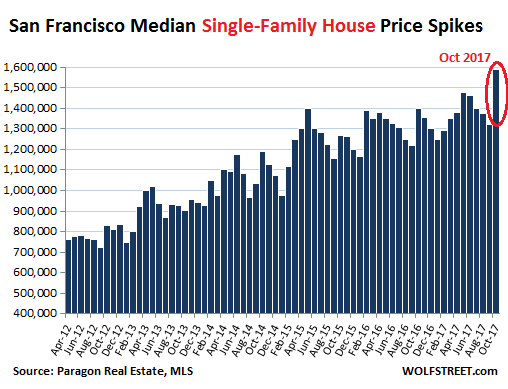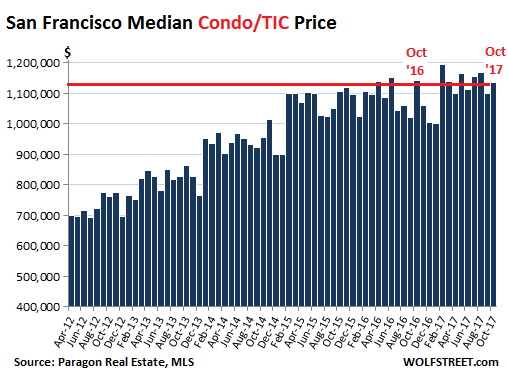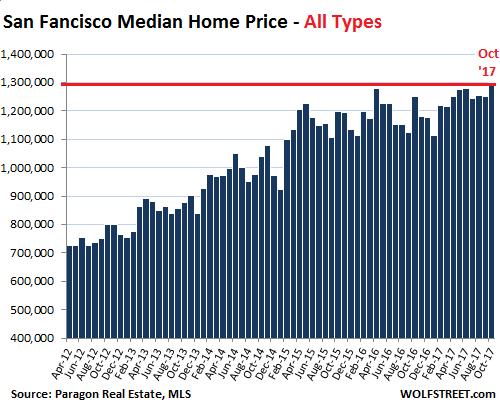A record luxury-volume spike in October.
The median selling price of a single-family house in San Francisco spiked by $113,000 from the crazy spike and peak in May, to a new record of – fasten your seat belt – $1.588 million, according to Paragon Real Estate Group. This was up 13.4% from October last year:

But it’s complicated, as they say. The market for condos, lofts, and TICs (Tenancy in Common, a peculiar San Francisco form of apartment ownership and financing) isn’t quite so ebullient. The median price – half cost more, half cost less – for condos ticked up year-over-year but remained below the August peak. The median price for TICs declined further. And the median price for both combined, at $1.134 million, was down a tiny bit year-over-year (-$5,500), as it is bumping into a ceiling of sorts, and after a downturn last year, hasn’t moved all that much since early 2015:

In San Francisco, condo sales outpace single-family house sales. Over the past 12 months, there were 3,602 condo sales and 2,256 house sales. So the overall median selling price for all types of dwellings is more impacted by condos than by houses.
Given the spike in house prices and the flattish prices of apartment units, the median price of all dwellings combined rose 4% in October from a year ago:

So what happened with single-family houses in October to cause this kind of crazy spike?
“October was a record-breaking month for luxury house sales, and more sales of expensive homes pull up the median price,” explained Patrick Carlisle, Chief Market Analyst at Paragon Real Estate Group, in his analysis.
He points out that “median price changes are not perfect measurements of changes in fair market value.” They’re volatile and seasonal. And they’re impacted by an increase in volume at either end of the price scale.
October sales are sales that closed in October though the homes might have gone under contract a month or two earlier. The price spike reported for October reflected activity that extended into September and August. And it’s not uncommon for the luxury home sales – those over $3 million – to surge during that time.
“In recent years, October has become the biggest month for very expensive house sales. This is not the case for luxury condos, which typically peak in spring,” said Patrick Carlisle, adding:
[T]he luxury home market grew dramatically from 2012 through 2015, cooled significantly in 2016 (especially the luxury condo segment), and then surged back in 2017 to hit new highs. But then everything seems to be surging higher nowadays, from stock markets to homes to iPhone prices.
What in fact happened in October was that sales volume of luxury houses (over $3 million) spiked to 38 sales, up from 25 sales during the spring peak, and up from just 13 sales in September. Luxury house sales accounted for 17% of total house sales, a new record high, up from their 10% annual share.
The prior record of luxury house sales was set during the luxury-volume spike in October 2016, when 36 of these houses were sold. There was no luxury-volume spike in October 2015. But October 2014 saw a luxury-volume spike, with 28 sales in that category.
These spikes in volume at the very high end skew the median price, given the relatively small number of houses sold in San Francisco. This is how an additional 30 sales at very high prices impact the already crazy median price for the entire market.
But rents in San Francisco have peaked. Even Seattle rents are under pressure from new construction. But rents are surging in mid-tier markets. Read… It Gets Serious: Biggest US Cities Where Rents Are Plunging
Enjoy reading WOLF STREET and want to support it? You can donate. I appreciate it immensely. Click on the mug to find out how:
![]()


I would like to see a study on who is purchasing these “luxury” condo’s and single family residences. Do they live in the homes? Second homes? Speculative properties? Do they live in the US?
With most of the big tech companies reducing staff or having hiring freezes, it is very unusual to see all this activity in these high end houses, if you ask me.
I live in SF and most of the “luxury” condo’s that I walk by every day and night, sit empty. No lights on, EVER!
I don’t know anything about anything in this realm… hands on
But from what I’ve read, that sounds like Chinese ownership.
“With most of the big tech companies reducing staff or having hiring freezes”. I’ve gotten a reach out from 3 out 5 FAANG companies just the last 3 weeks.
AND I work for a company that does not even make a profit, and we can’t hire fast enough.
There’s NOTHING in the Bay Area that tells you that things are slowing down significantly.
Apple -> Blockbuster earnings
Google -> Blockbuster earnings
Facebook -> Great earnings, but their spend will go up so people are not that excited.
Netflix -> the only laggard of the group.
The slow, steady advance of “technology” is deflationary. In fact, I think (now) it is one of the things underpinning the huge monetary expansion that has been going on for years if not decades (i.e. the gains are accruing to a small few and the masses aren’t figuring out how much the needle is really moving).
To be really, really clear – picking a random example – if cars are actually getting CHEAPER to make, due to AI, robots, foreign labor and all that – why do they cost just a bit more every year?
YMMMV (Your Mile Marker May Vary).
Buckle up!
Regards,
Cooter
HINT: Demographics are ruining the pudding.
Depends on the vehicle. Sedans in the economy market cost about as much today as they did when I was in highschool in 2003.
Got my used hyundai elantra then with 30k miles for $10k. Same thing today in 2017 costs about $12k. Got one new for $16k and it is way better quality overall.
Only suckers are experiencing sticker shock with cars, ie people spending 40k on trucks or 35k+ on luxury cars ect.
Most electronics have gotten cheaper. Except now your $2k computer is an $800 computer in your pocket and it has a high chance of being lost or stolen.
It’s a revolution. Consider ride-share/Uber/Lyft ect… no need to buy a car, call one up on demand with your smartphone anytime. Owning or leasing a car is no longer relevant- there are new, better business models out there.
Do you work at Snap?
Because if you do – that place will never ever ever ever make a profit.
Snap has no presence in the Bay Area AFAIK.
Looks fairly positive to me as well. Cooling? Probably. But still pretty hot.
What a meaningless post. I’ve got 20 people a day looking at my linkedin profile, therefore the bay area tech economy must be doing great! duh… There has been a noticeable drop in VC funding from the 2015 peak. Look here,
https://www.bloomberg.com/view/articles/2017-07-16/san-francisco-s-vc-boom-is-over
Yes, the boom is over, and San Francisco is sinking fast.
No study needed – all done long ago in Vancouver, BC. Allow me to save you the trouble of more enquiry:
“Do they live in the homes?” No, or at most, occasionally. Dwelling is sometimes occupied by poor country cousins and retainers.
“Second homes?” Yes, if not third, fourth, etc.
“Speculative properties?” The goal is money laundering, with speculation a secondary attraction.
“Do they live in the US?” Occasionally.
“it is very unusual to see all this activity in these high end houses, if you ask me.” It won’t be unusual if the trickle-down of hot Asian money formerly absorbed by Vancouver continues.
“I live in SF and most of the “luxury” condo’s that I walk by every day and night, sit empty. No lights on, EVER!” No need, eh?
Awesome post. All SF has to do is look to Vancouver to see where things are going. BTW, my SF neighborhood is a ghost town. How do I know? My street and the surrounding streets were completely dark on Halloween (maybe the odd light ehre and there). I know it’s not scientific, but driving around town speaks volumes that night.
It’s money laundering, and parking ill-gotten gains in a first-world country that’s very, very soft on such things. INTERPOL can’t touch you here!
Isn’t 50% or more of sf housing tied up in ‘free’ — ooops, I mean ‘fair’, oh sorry I mean ‘rent-controlled’ — housing. So, naturally any efervescent demand should spike prices, no?… PJS
“Rent control” in San Francisco covers only multi-family buildings built before 1978. It doesn’t cover single-family houses or rented condos. Rent control means the renter pays market rent during the first year, but then the landlord can raise the rent only at a rate tied to CPI. So rent-controlled rents start at market then rise with inflation.
Rent control essentially means that a rental agreement is a long term contract.
What I think is interesting is people get bent out of shape about rent control, where in commercial real estate long terms tend to be the norm. I’m not sure how it is now but company I worked for in the 90’s signed a 20 year lease on a newly constructed office building. Unsure but I think the lease was needed to refinance the construction loan. Place we are now we have a 5 year lease.
Long term leases are available to qualified commercial tenants because the covenant is strong, i.e. the tenant is bound almost as strongly as the landlord.
Other than very wealthy individuals with public personas, there is no such thing for a residential tenancy. What are you going to do if they leave town, hire private detectives?
A long- term lease to a residential tenant, really only binds the landlord. Sure you can get judgement if a tenant defaults, but if your lawyer is your friend, he’ll tell you to save your money.
This is why prudent residential landlords do not enter long term leases.
Residential tenancy law is very different from commercial law. the former being much more tenant- friendly, in some places absurdly so.
NYC gives rent control a bad name. Even vacant apartments have their prices “stabilized”.
You can raise it only 60% of CPI. So if CPI would indicate an increase of $10 for the year, the landlord can only pass along $6 to the tenant. (I used to be a SF landlord.)
How the Board of Sups ever came up with the 60% is anyone’s guess. I’m surprised they didn’t go with 10%. I seem to recall in 2010 they were talking about a waiver for tenants that had been impacted by the financial crisis, but I’m not sure if that was enacted.
I lived in a rent stabilized apt in NYC during the 70’s and 80’s. The CPI was in the double digits and renters couldn’t afford to absorb increases at those rates. The increases were capped at a high of 5% for a three year lease. I think this became a model for other areas.
Rent controls are helpful only to those in a unit at the time enacted. Once in place they force the owner to pre raise the rent, i.e. price future restricted increases upfront to cover the future costs. Initial rents are thus in an inflationary spiral.
This applies in all markets. A similar trend occurs in Louisiana P&C insurance, state law dictates that insurers can not drop a homeowner after three years of continuous coverage. So insurers underwrite reasonably for three years and beginning in year 4 premiums increase by 10-12% per year, by year 5 the consumer shops for a better rate and the process starts again.
There is no law which can control human nature.
October has become the biggest month for very expensive house sales
Wolf,
you ever think of cashing out and sitting on your cash and then rebuy at the bottom? I realize that is easier said then done but how much longer can this insanity continue?
I realize that is easier said then done but how much longer can this insanity continue?
This insanity will continue as long as the Keynesian fraudsters at the central banks are adding at least $2 trillion a year to their balance sheets, levitating all asset bubbles.
Please explain how Quantitative Easing and other Fed policies intended to raise the value of financial assets have anything to do with Keynes or Keynesian policies.
He read it on Mish, so it must be true.
/s
They don’t. It’s just that Alex Jones says Keynesianism baaaaaaaaaad…
Monetizing debt and lowering interest rates to “stimulate” demand and take up “slack” is pure Keynes
That strategy has backfired for a lot of regular people (owner occupants). But I know some who cashed out and moved to a cheaper part of the country – that works really well if living there also meets your other needs and wishes.
For investors, that strategy also works.
But we love it in SF and have no intention of moving. The Bay is just a few blocks from here, and I go swimming in it on a near daily basis to clear my head. It’s great (but cold). So I guess we’re stuck :-)
I saw that strategy fail, close-up. My father believed you could buy a house, it’d go up in value, buy a bigger house, it’d go up, then buy the final house. Sheer idiocy. This is probably the biggest reason my family plummeted into Appalachian-level poverty at least for Mom and us kids. This idiocy was closely followed by the idiotic idea that a decent living can be made programming computers. Maybe for a 20-year time window, in California, if everything lines up juuuuuust right.
you may not be able to find product at the bottom. at the bottom in 2008 properties in foreclosure were not moving. legal access to title was in question. you could easily see half the SF RE taken off market. (in the 30s farmers plowed crops under, there was no food to eat, and farms sat idle)
this is why they call it a DEPRESSION
You have a point. I personally know a couple that just stopped making the mortgage payment and lived mortgage free for 48 months.
Being the morons they were they blew the cash BUT many did the same thing and saved the cash. And when the bank finally came calling they had a nice big fat down payment for a cheaper house down the street with the banks all too willing to let them buy back in.
They even had a name for these deadbeats, boomerang buyers.
What a great big FU and insult to those who actually paid their mortgages……we live in a society that if you play by the rules you are a sucker and a fool……which I am.
Oh and I was listening to “Handle on the law” during that time and a caller had that exact title issue you speak of. The bank couldn’t produce it and Bill told the caller he was in the clear…..a free fucking house. You should have heard how giddy that caller was…….I wanted to throw the radio across the room.
Well stated. I think a good case could be made of historical situations analogous to this indicating the disintegration of empires-an assumption by the empire’s clever that the supply of rules-players in their society is inexhaustible and infinitely-pliable, or at least through the lifetime (or maybe just the next quarter) of the clever. A better day to us all.
I hear condos in the Leaning Tower of San Francisco might be available at a discount.
http://www.businessinsider.com/is-millennium-tower-safe-still-leaning-sinking-2017-9
“But then everything seems to be surging higher nowadays, from stock markets to homes to iPhone prices.” This is a bad sign.
Why? As long as people are still able to buy. It seems there’s infinite money out there.
Infinite borrowed money anyways.